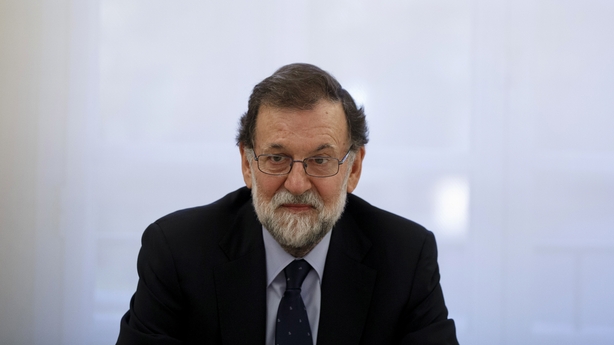Catalonia's leader has come under intense pressure to abandon plans to declare independence from Spain after hundreds of thousands of unionists took to the streets at the weekend to protest against the region breaking away.
Spain fears the Catalan parliament will vote for independence tomorrow, when Catalan leader Carles Puigdemont is due to address the assembly in the wake of a banned 1 October referendum in which Catalan officials say people voted overwhelmingly for secession.
Under Catalonia's referendum law, deemed unconstitutional by Madrid, a vote for independence would start a six-month process that would envisage divorce talks with Spain before regional elections and a final act of separation.
But the Spanish government, buoyed by yesterday's protests in Barcelona, the Catalan capital, have made it clear it would respond immediately to any such vote.
"I'm calling on the sensible people in the Catalan government ... don't jump off the edge because you'll take the people with you," Spanish Deputy Prime Minister Soraya Saenz de Santamaria said in an interview with COPE radio station.
"If there is a unilateral declaration of independence there will be decisions made to restore law and democracy."
Spanish Prime Minister Mariano Rajoy has not ruled out removing Catalonia's government and calling new regional elections if it claims independence.

In an interview with German newspaper Die Welt, Mr Rajoy said that Spain will not be divided.
The leader of the opposition Socialist party, Pedro Sanchez, has called on Mr Puigdemont to "stop everything" as he threatens to formally declare independence.
"If he's watching us, if he's listening, stop everything and don't declare unilateral independence," he told reporters in Barcelona.
The stakes are high for Spain as it faces its biggest political crisis since it became a democracy four decades ago.
Losing Catalonia, which has its own language and culture, would deprive Spain of a fifth of its economic output and more than a quarter of exports. A stream of Catalonia-based firms and banks have moved their legal bases outside the region.
The crisis has also reopened old divisions in a nation where fascism is a living memory easily revived by strong displays of nationalism.
Among many moderate Spaniards, though, there is widespread opposition to a breakaway, including in Catalonia. Most of the region's unionists boycotted the 1 October referendum, which was banned by Madrid and marred by a violent police crackdown.
The European Union has also shown no interest in an independent Catalonia, despite an appeal by Mr Puigdemont for Brussels to mediate in the crisis.
France, which borders Catalonia, said today that it would not recognise a unilateral independence declaration.
Yesterday, a crowd estimated by local police to number 350,000, took to the streets of the Catalan capital Barcelona, waving Spanish and Catalan flags and carrying banners saying "Catalonia is Spain" and "Together we are stronger".
The show of support for Madrid helped calm Spanish markets this morning, along with comments last Friday from credit rating agencies Moody's and DBRS that they expected Spain to remain united.
Spanish borrowing costs fell to a one-week low and the main share index touched a week high.

